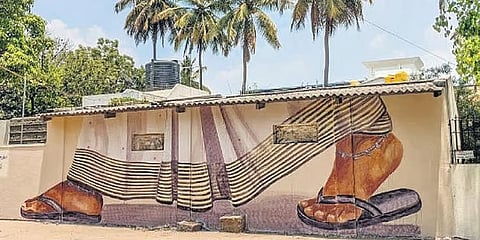
- LIFESTYLE
- FASHION
- FOOD
- ENTERTAINMENT
- EVENTS
- CULTURE
- VIDEOS
- WEB STORIES
- GALLERIES
- GADGETS
- CAR & BIKE
- SOCIETY
- TRAVEL
- NORTH EAST
- INDULGE CONNECT

Cities are an extension of who we are and of the people who inhabit them. They mirror our anxieties and hold space for the selves we grow into. Delhi, for instance, is known for its sprawling markets, ancient monuments, endless stories and chaos — but for every Delhiite, the city is a home and a memory.
It’s the same for author and philosopher Sundar Sarukkai of Bengaluru, whose new book Water Days (Westland) explores what his home city has meant to him — through the unravelling of a mystery.
Sarukkai presents his city as if it were another character. Set in the late 1990s in Mathikere Extension, a locality in north Bengaluru — where he once lived — the novel follows Raghavendra, a security guard and reluctant detective, through 13 days after the death of a young girl. The book unfolds as a tale about belonging, migration, and the heartbreaks that reshape a city.
A city’s language
In the beginning of the book, he asks: “How does one write in the mother tongue of a city?” Bengaluru, he says, speaks not just in Kannada or Tamil — but in a sensorial language, “of the rain, of the water taps, of the street dogs, the slushy roads.” The book is filled with “dialects of English”, shaped by the city’s streets, silences, and identities.
Set in the ’90s, Water Days might seem nostalgic, but Sarukkai isn’t romanticising the past. Instead, the novel becomes a lens into the communities that constitute Bengaluru — and a reflection of their everyday lives. “The question of everyday life really interests me,” he says. “From the way society functions — how it is driven by everyday processes and people.”
For Sarukkai, the novel is ultimately about “what happens to a city silently.” He maps the gestures of people in transition — those pulled into unexpected events. “That’s how cities work too — they pull you into something before you even realise you’re a part of it,” he says.
Language politics
Today, Bengaluru is at the centre of increasingly hostile language politics. Non-Kannada speakers are often told to “speak Kannada”. But Sarukkai asks: “What was the identity of Bengaluru to begin with?”
Unlike cities with strong linguistic identities like Mysuru or Mangaluru, Bengaluru, he says, has always been more fluid. Once called the “garden city,” it later became a “science city” and then a “tech city” — but he says its true nature was shaped by migrants. “Tamilians came with factories. Then Telugu speakers dominated real estate. Now labourers come from Odisha, Bihar, and North Karnataka. These are also the people who built the city,” he says. “So this fight about Kannada isn’t about language — it’s about power. About who gets to belong.”
To him, real language is culture, not coercion. “Kannada is a beautiful language with an extraordinary literary tradition. But when it’s used politically, stripped of its depth, it becomes something else.”
People of Water Days
The novel introduces a constellation of characters that reflect a city in flux: Raghavendra, a middle-aged security guard who becomes an unlikely detective; Poornima, his sharp, grounded wife; Rajesh, a Bihari student who avoids engaging with the city; Nagaraj, a scheming friend with political links; and Mari Muthu — later Mari Gowda — who reshapes his identity to fit in.
But at the centre is Raghavendra — no Poirot or Holmes, just a man navigating loneliness and survival. Sarukkai, a fan of Lee Child and John Le Carré, pairs his protagonist’s modest dream of running a grocery store with a reluctant detective arc, using it to question the very idea of crime fiction in India. “How do you write a detective story in a country where the family is always involved — in everything? In the West, detectives function independently. Here, you can’t move without your family’s input — your job, your marriage, even where you live.”
This social fabric becomes the case itself. Raghavendra’s investigation is less about finding a culprit and more about navigating the city’s tangled web — of class, language, fear, and fate — all while holding onto his quiet dream.
Water Days is Sarukkai’s second novel, after Following a Prayer (2023), a more emotionally intense debut set in a remote village in the Western Ghats. That book dealt with rural silences and young girls’ inner lives. Water Days, by contrast, is gntler — even lighter. “With Following a Prayer, people told me they felt deeply moved, even angry,” he says. “But now, I just want them to smile. And maybe, next time they walk Bengaluru’s streets, they notice the small things — the sounds, the silences, the people — that make a city a city.”
(Written by Adithi Reena Ajith)
For more updates, join/follow our WhatsApp, Telegram and YouTube channels.